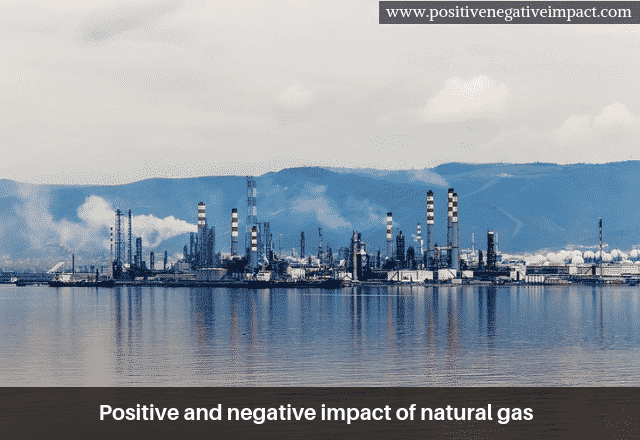Natural gas is an organic byproduct of fossilized remains of ancient organisms – if that sounds icky, well the process to mine the same is not easy either and often consists of drilling through several miles of hard rock. While early earth formed and life finally took hold on this planet, it started to blossom with various forms of flora and fauna including giant redwood forests to large ferns; and as these organisms died and were buried as a result of mudslides, floods and other geological incidents, these soon sank deep into the sediment where they became partly fossilized. And as the organic matter, becomes exposed to extreme heat and pressure, it undergoes further change and gets converted to gas and other compounds. For example, natural gas is often found in close proximity to various hydrocarbon reservoirs including coal beds. The process of extracting the same is hard, if not downright difficult which is why it is essential that we take a closer look at some of the positive and negative impacts of natural gas.

The Positive Impact of Natural Gas
- Power generation: Natural gas is widely used for energy and power generation; moreover natural gas burns more cleanly and does not provide soot. It produces 45% less carbon when compared to petroleum, coal etc and contains less oil. And since it is energy efficient, natural gas has seen widespread applications, more so than any other variant; vehicles these days are outfitted to utilize natural gas as fuel, more so than petrol. But it will be some more time before natural gas hogs the top spot as the preferred energy source, but it is already seeing widespread usage in various consumer applications.
- Cheaper: Natural gas is more abundant in supply than any other fuel and as such, the cost is much less. Naturally, given the low cost, natural gas is often preferred for cooking and heating up homes as the end cost to the consumer is much less. It should also be pointed out that although the cost of natural gas is cheaper when compared to other fuel sources, the fact remains that we do not have an infinite supply of natural gas and we need to be more conservative in our usage of the same.
- Transportation: The other advantage that natural gas has over other forms of fuel is that it is easier to transport from one point to another. More often than not, it is transported in the form of barrels, making it easier to transport the same from one end to the other, and in the process, expand less in terms of carbon footprint
The Negative Impact of Natural Gas
- Environmental impact: The process of sourcing and extracting natural gas from under miles of bedrock has a detrimental impact on both flora and fauna. Oil companies often drill for miles underneath the bedrock and even use fracking methods to extract natural gas. And in the process, the chemical runoff, from the drilling site often pollutes local water bodies, affecting the health of nearby residents as well as impacting the natural habitat of several species, and in the process exterminating them. Widespread drilling and fracking have led to increased levels of arsenic in local water bodies as well as the presence of other toxic chemicals.
- Earthquakes: Fracking has been linked to earthquakes as well; since fracking consists of using highly pressurized water to cause fracking deep in the bedrock, this can help set off minor earthquakes in areas that are prone to frequent earthquakes. As of date, no detailed study has been conducted on the same so no conclusive proof on the same exists but there have been cases of earthquakes being reported after the fracking tech was utilized to extract natural gas from a particular location.
- Cost: The process of extracting natural gas is expensive as it often requires specialized plumbing mechanisms, pressurized containers for storing the natural gas and several chemicals including a ready source of water supply to help extract the same. It is only the fact that natural gas is often abundant that helps offset the cost, but it should also be pointed out that natural gas is a limited resource, at best and the cost for extracting the same is bound to increase over time.
These are some of the positive and negative impacts of natural gas; the fact remains that we use natural gas in most commercial applications as a viable alternative to petrol or diesel.
- Tulip Mania – The Story of One of History’s Worst Financial Bubbles - May 15, 2022
- The True Story of Rapunzel - February 22, 2022
- The Blue Fugates: A Kentucky Family Born with Blue Skin - August 17, 2021
